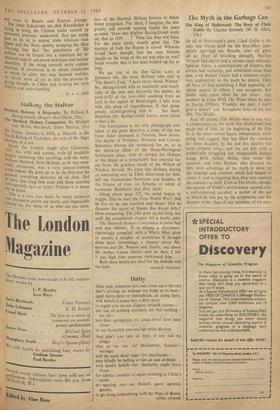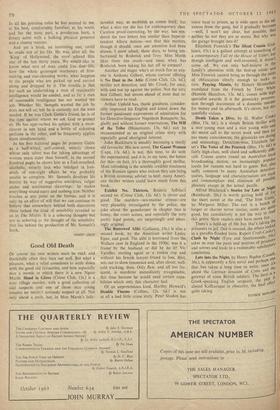The Myth in the Garbage Can
01- all of Hollywood's stars, Clark Gable is the only one whose hold on the box-office com- pletely mystified me. Brando, after all, gives off an effect of brooding strength; Marilyn Monroe bad charm and a certain rapid delicacy; Spencer Tracy, a contemporary of Gable's, has always had authority, and sometimes more than that; even Robert Taylor had a winsome empti- ness appropriate to the parts he played. They all have or had something I find appealing, or whose appeal to others 1 can recognise. But Gable only came alive for me twice: that moment in Gone With The Wind when he says to Scarlet O'Hara, 'Frankly, my dear, I don't give a damn!' and throughout most of his last film, The Misfits. And, of course, The Misfits was in one way a commentary on the myth that Hollywood had made out of him. At the beginning of the film he is the same unreal figure, independent, wild- living and rugged, that has filled the cinemas for three decades; by the end this identity has been stripped away, and we are left with a pathetically struggling but recognisable human being. Both Arthur Miller, who wrote the scenario, and John Huston, who directed the film, took advantage of the myth to show up the longings and evasions which had helped to create it, and in exposing that, they also exposed the audience to itself. Even in The Misfits, though, the success of Gable's performance seemed only a well-contrived accident, a matter of the use to which he was put by the scriptwriter and the director rather than of any intention of his own.
In all his previous roles he has seemed to me, at his best, comfortably. familiar; at his worst, and for the most part, a ponderous bore, a dreary actor with a hulking physical presence and a clumsy manner.
And yet a book, an interesting one, could be made out of his life. He was, after all, the 'King' of Hollywood, the most adored film star of the last thirty years. We would like to know what sort of man could live that life, how the whole grotesque machinery of film- making and star-choosing works, what happens to the people who are picked up and carried along and dropped by it. The trouble is that for such an undertaking a man of reasonable intelligence would be. needed, and so far a man of reasonable intelligence has not wanted the job. Whether Mr. Samuels wanted the job he does not tell us, but he is certainly not the man needed. If he was Clark Gable's friend; he is of the type against whom we ask God to protect us. He has approached his subject with -a meat- cleaver in one hand and a bottle of sickening perfume in the other, and he frequently applies them simultaneously.
In his first hundred pages he presents Gable as a half-witted, self-centred, miserly clown whose only talent was for taking advantage of women years older than himself; in the second hundred pages he shows him as a foul-mouthed, alcoholic, miserly lout who indulged in hun- dreds of one-night affairs he was probably unable to complete. Mr. Samuels develops his history by way of suggestive anecdotes, vulgar asides and sentimental slaverings: he makes everything sound nasty and nothing true. Neither touches at any point on the human, and it is only by an effort of will that we can continue to believe that somewhere behind both distortions there lurked the kind of sensibility revealed to us in The Misfits. It is a sobering thought; but not as sobering as the thought of the sensibility that lies behind the production of Mr. Samuels's book.
SIMON GRAY







































 Previous page
Previous page